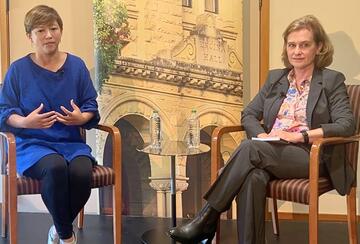APARC News
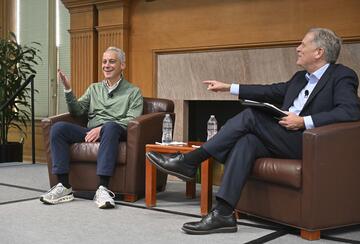
"Trump Tries to Rule, Not Govern": Rahm Emanuel on America's Political Crisis and Fading Alliances
In a Stanford fireside chat and on the APARC Briefing podcast, Ambassador Rahm Emanuel warns of squandered strategic gains in the Indo-Pacific while reflecting on political rupture in America, lessons from Japan, and the path ahead.

Gavin Shatkin, a Lee Kong Chian NUS-Stanford fellow on Southeast Asia at APARC, argues that prevailing urban development challenges in Jakarta, Metro Manila, and Bangkok stem from Cold War-era political and institutional structures imposed by U.S.-backed authoritarian, anti-communist regimes.
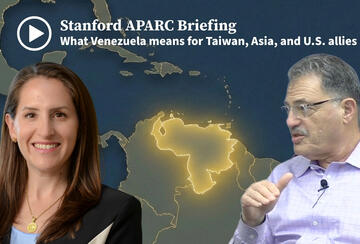
Speaking on the APARC Briefing video series, Larry Diamond and Oriana Skylar Mastro analyze the strategic implications of the U.S. operation in Venezuela for the balance of power in the Taiwan Strait, Indo-Pacific security, America’s alliances, and the liberal international order.
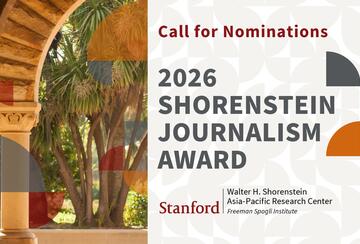
Sponsored by Stanford University’s Shorenstein Asia-Pacific Research Center, the annual award recognizes outstanding journalists and news media outlets for excellence in covering the Asia-Pacific region. News editors, publishers, scholars, and organizations focused on Asia research and analysis are invited to submit nominations for the 2026 award through February 15, 2026.
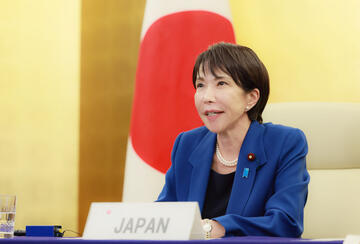
Stanford sociologist Kiyoteru Tsutsui, director of the Shorenstein Asia-Pacific Research Center and the Japan Program, evaluates Japanese Prime Minister Sanae Takaichi's first month in office.
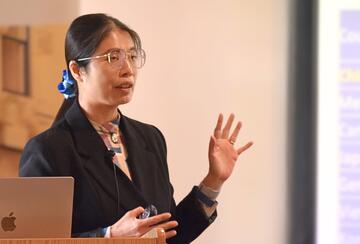
Taiwan’s experience reveals that trade credit linkages are a substantial transmission channel for global trade shocks, according to research by National Chengchi University’s Hsiao-Hui Lee, an expert in supply chain management. Her work highlights the need to include financial network management in strategies for supply chain resilience.
Award-winning filmmaker Ema Ryan Yamazaki discussed her documentary portrait of a large Japanese elementary school in suburban Tokyo and reflected on the delicate balance between community and self.
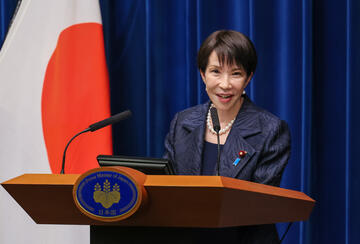
Stanford sociologist Kiyoteru Tsutsui, director of the Shorenstein Asia-Pacific Research Center and the Japan Program, explains the path to power of Japan’s first female prime minister and what her leadership means for the country's future.
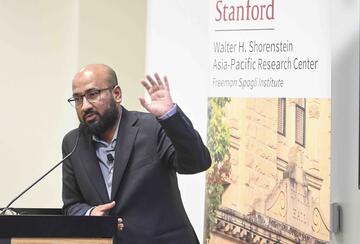
The 2025 Shorenstein Journalism Award recognized Netra News, Bangladesh’s premier independent media outlet, at a celebration featuring Tasneem Khalil, its founding editor-in-chief, who discussed its mission and joined a panel of experts in considering the prospects for democracy in Bangladesh.
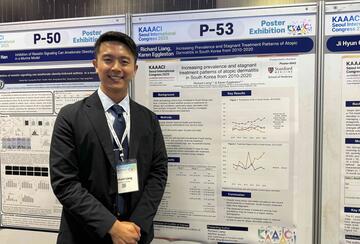
Spanning medicine, public health, and East Asian studies, Richard Liang’s rare academic path at Stanford has fueled collaborations that bridge research and policy across borders and disciplines.
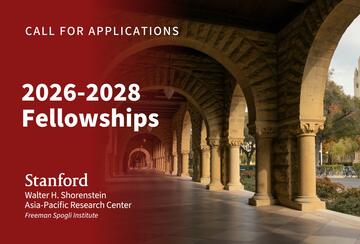
The center offers multiple fellowships in Asian studies to begin in fall quarter 2026. These include a postdoctoral fellowship on political, economic, or social change in the Asia-Pacific region, postdoctoral fellowships focused on Asia health policy and contemporary Japan, postdoctoral fellowships and visiting fellow positions with the Stanford Next Asia Policy Lab, and a visiting fellow position on contemporary Taiwan.
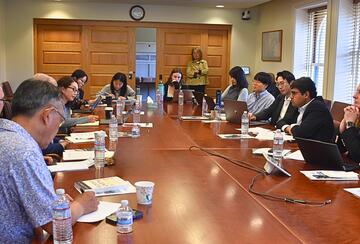
Stanford Next Asia Policy Lab Probes Political Messaging and Public Attitudes in U.S.-China Rivalry
At a recent conference, lab members presented data-driven, policy-relevant insights into rival-making in U.S.-China relations.

Despite rising health care spending, adults in South Korea’s lowest-income quintile experience the smallest relative improvement in life expectancy and well-being, according to a new study. The co-authors, including Stanford health economist Karen Eggleston, call for the country’s health policy to prioritize both equity and value, and highlight lessons for other health systems.
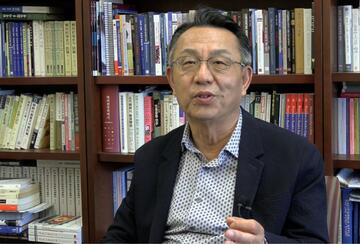
In his new book, The Four Talent Giants, Shin offers a new framework for understanding the rise of economic powerhouses by examining the distinct human capital development strategies used by Japan, Australia, China, and India.

New research by a team including Stanford health economist Karen Eggleston provides evidence about the positive impact of China’s urban-rural health insurance integration on mental well-being among rural seniors, offering insights for policymakers worldwide.

A comprehensive review of rapidly aging South Korea’s efforts to mitigate the social and economic costs of Alzheimer’s disease and related dementias, co-authored by Stanford health economist Karen Eggleston, provides insights for nations facing policy pressures of the demographic transition.

A Stanford student and four recent alumni who served as research assistants at the Stanford Next Asia Policy Lab will begin doctoral studies at top institutions in fall 2025. At the lab, which is committed to rigorous, policy-relevant research and student mentorship, they gained hands-on experience and honed skills valuable for the next stage of their academic journeys.

A co-authored study by a team including Stanford political scientist Jean Oi traces how the Chinese central government’s shifting policies during the COVID pandemic exposed its fiscal fault lines and created a local government liquidity crisis.

Bangladesh-Focused Investigative Media Outlet Netra News Wins 2025 Shorenstein Journalism Award
Sponsored by Stanford University’s Shorenstein Asia-Pacific Research Center, the 24th annual Shorenstein Journalism Award honors Netra News, Bangladesh's premier independent, non-partisan media outlet, for its unflinching reportage on human rights abuses and corruption in Bangladesh and its efforts to establish and uphold fundamental freedoms in the country.
At its first convening in Taiwan, APARC’s Taiwan Program gathered scholars and industry experts to consider policy measures and practices for tackling the technological, economic, social, and demographic forces shaping the island nation’s future and strategies for ensuring its continued growth and success.

The award recognizes Shin’s contributions to advancing Korean studies and strengthening U.S.-Korea relations through scholarship and bridge-building.

Sponsored by Stanford University’s Shorenstein Asia-Pacific Research Center, the annual Shoresntein Award promotes excellence in journalism on the Asia-Pacific region and carries a cash prize of US $10,000. The 2025 award will honor an Asian news media outlet or a journalist whose work has primarily appeared in Asian news media. Nomination entries are due by February 15, 2025.

As political chaos plays out in South Korea following President Yoon Suk Yeol's short-lived martial law attempt, Stanford sociologist Gi-Wook Shin, the director of APARC and its Korea Program, analyzes the fast-moving developments.

In a new paper, a research team including Stanford health economist Karen Eggleston discusses the challenges and opportunities digital health technologies present in South and Southeast Asia, sharing evidence-based recommendations for shaping effective digital health strategies in low- and middle-income countries.

Lab members recently shared data-driven insights into U.S.-China tensions, public attitudes toward China, and racial dynamics in Asia, urging policy and academic communities in Washington, D.C. to rethink the Cold War analogy applied to China and views of race and racism in Asian nations.


